- Home
- Kathryn Lasky
Mary Queen of Scots Page 8
Mary Queen of Scots Read online
Page 8
Of course he is right. How could I be so ignorant? How could I make such a blunder? With the stroke of my pen I could upset the delicate relationship between France and England. I could jeopardize my mother in Scotland. I could jeopardize all my Scots subjects. I am mortified by my own stupidity. My eyes welled with tears. The posing session was halted and I was excused. Now I stand here bare in my stupidity before my mirror, the impression of the jewelled bodice still upon my skin. Will I ever truly be fit to be the Queen I have already been crowned? I must temper my feelings, hold my tongue, and be less impulsive and more considered in my thoughts. I must grow up. I resolve to do this.
April 15, 1554
Perhaps it is a sign, but my uncle the Cardinal came to me today and informed me that I am to begin preparations for my First Communion. What better indication could I have that it is time for me to grow up? Am I ready? I am not sure. Have I sufficiently reflected and examined my conscience? Many things in life have come easily to me. I am skilful with my hawks in the field. I ride expertly. I was quick to master the larger bow. My studies, save for mathematics, do not prove too difficult. But First Communion calls for something quite different from these skills.
April 21, 1554
The new music teacher arrived. His name is Lorenzo Marcellini. He is most odd. He is afflicted with some nervous disorder and seems caught in a web of tics and twitches. He stutters and blinks rapidly. His face is a bit strange as well for he is slightly wall-eyed and his nose takes a sharp bend to the left. Oh well, he does play the cithara beautifully. And when he plays, all his tics and twitchings seem to dissolve. I am eager to resume my musical studies.
April 22, 1554
The weather, thankfully, has turned cool again. My portrait progresses. Between the posing for my portrait, the preparation for my First Communion, and my music lessons, in addition to my regular studies, I have hardly had any time for any of my favourite amusements, such as riding and hawking and practising my archery on the larger bow. I shall not complain, though, for all these pursuits that I now do are most important for my moral development and my future duties as Queen. Clouet tells me that Queen Mary’s father, Henry VIII, was a superb musician and a composer as well. He improved immensely the quality of court life through his devotion to the arts. The court life of Scotland and England has suffered from being regarded as coarse, uncivilized, and bordering on barbarism, at least in comparison with the French and Italian courts, which are considered the height of cultivation and devotion to the arts. So it is not idle for a Queen to spend her time in artistic pursuits. I have spoken to Signore Marcellini about my desire to learn musical composition. Perhaps I could set to music a poem that I write for Ronsard. I do want to write something of pure and lasting value. But right now I must actually turn my thoughts to my dear mother and write her the news of my preparation for my First Communion.
April 24, 1554
I think about the poison rumours that whirl about Queen Catherine. I write this now and I pray no one ever discovers this diary. But I must write in it. Perhaps if my mother were here, I would not feel this way. I have my friends but I have no mother to whom I can tell my most secret thoughts and fears. A daughter and a mother have in a sense a shared heart. There are still many things that I cannot disclose because of the distance from my mother, and there are many things that a normal girl might disclose to the hearts of her closest friends, but since I am a Queen I cannot. Thus my diary has become my paper heart.
April 26, 1554
I am practising having a good temper toward Signore Marcellini. You see, Signore Marcellini, although not nearly as vexing as Madame de Parois and Queen Catherine, presents me with some problems. I do not particularly enjoy being in his presence. Not only does he twitch and his one eye seem to slide off the side of his face, but he also has a strong breath. Very cheesy breath. I cannot bear it when he leans over me and places his hands on top of mine to guide my fingers on the keyboard of the virginal. And yet he is a wonderful music teacher and he delights in my desire to learn composition. Not only that, he has invited the four Marys to join our lessons and promises to make us into a quintet with me on the virginal, Mary Beaton and Mary Livingston on the lute, and Mary Fleming and Mary Seton on the cithara.
April 29, 1554
I am getting much practice in developing good temper! First of all, Signore Marcellini seems to come often to work with me and the four Marys on our quintet. He is always suggesting practice times. And although I much prefer this to our ballet practices, he is here so much, and often lingers, until finally I feel it impolite if I do not invite him to stay for a cup of chocolate or cider. Janet Sinclair says I must always invite him, for he puts so much effort into our music lessons and he does not need to be teaching the four Marys as well, which he does only from the goodness of his own heart.
The second way in which I practise good temper is with my uncles. Since they have been here, my uncle the Cardinal and Uncle Francis have begun talking more and more about my marriage to Francis. In truth, I think – no, I know – they are fearful that because of his poor health he might die soon. I cannot bear the idea of losing him. I think of him not as an intended husband but as a dear friend. I can share the same sorts of thoughts and secrets with Francis as I do with the four Marys. How many boys can one do that with? He is like a brother to me but better. So although it disturbs me when my uncles speak of marriage, it disturbs me more that they do so because they fear for his life. I feel that across the bright light of our friendship slides the shadow of death. I shall be no more or less sad if I am, through Francis’s death, left a widow or a maid without a friend. Death is death, and the loss will be incalculable whether I am married to him or not. So I do wish that my uncles would stop their talk. I know that all weddings amongst royal families have more to do with alliances and balances of power than love, but can they not let us have this friendship for now without casting these shadows upon it? It is true what Francis said that time when we were playing chess – that we are not so much children and sons and daughters of parents as we are pieces on a gigantic chessboard called Europe, that I am to be his in order to help checkmate England. I do wonder sometimes what it might be like to be ordinary – not a Princess or a Queen, but rather of simple birth, and to marry not to balance powers and check kingdoms but simply for matters of the heart. I think indeed I would still marry Francis, for he is so agreeable and of such a kind nature.
May 2, 1554
These are very secret thoughts that I now commit to these pages, but I must write them out, for indeed they have been haunting me since I last wrote in my diary. Until that moment when I wrote those words, wondering what it would be like to be of simple birth, I had never contemplated a notion of marriage for reasons other than those of state and politics and power and kingdoms. Now the thoughts sweep through my mind like the gusts of gale winds. My brain, nay, my heart as well, is in tumult. Francis is agreeable, and he is of kindest nature. Our minds are often as one when we study together or hunt or hawk or play, but I began to think, what if Francis were taller – as tall as, say, Robin MacClean, the head guardsman? I remember so well Robin carrying Mary Beaton ashore at Chenonceau. Water dripping from his huge shoulders. Icicles forming in his dark red beard. Will Francis ever grow a beard? His skin is as soft as mine. When I think these thoughts, I feel something stir deep inside of me. It is a feeling that is new to me. I know not what it is. But it is exciting and it makes my cheeks flush red. This much I know without looking in the mirror.
Two minutes later
Janet Sinclair just came in and blurted out, “Child, do you have a fever? You are bright red.”
I nearly slammed shut my diary. This would be a giveaway and arouse curiosity. “Oh, no,” I said. “I was just coughing.” I then coughed. She seemed convinced. And then she said that Signore Marcellini was here for my music lesson. “Again!” I cried.
“Ye
s, he wants to prepare you for the Midsummer Night’s feast.” But I told her that this was the most ridiculous thing, for Midsummer Night is weeks off! And we shall not even be here but at Chenonceau or Amboise!
PS My portrait is nearly completed.
May 4, 1554
The weather has turned quite warm again, and now I am able to go to the great fountain for a picnic with the children, as Clouet no longer needs me that much for the portrait. Robin MacClean will accompany us and promises to bring a slingshot to teach us how to fling stones great distances.
Later
Horror! Signore Marcellini insisted on coming to our picnic. He arrived with his cithara and announced that music was the perfect accompaniment for a picnic. But, in fact, I do enjoy just the rustling of the leaves and the sound of the tumbling water of the fountain. He sat next to Mary Fleming, and I noticed that she was exceptionally quiet. I could not help but compare the men in our company. There was Lord Erskine and then Janet Sinclair’s husband, John Kemp, both somewhat portly but men of fine posture and a hearty, easy manner. Then there was Francis. His skin perspired slightly and looked almost translucent. Colour never seems to creep into his face on even the warmest days. His shoulders were hunched and his nose was running as usual. Then there was Signore Marcellini, all twitches and tics, stuttering and spilling his food on the cloth we had spread. And finally there was Robin MacClean leaning against the immense oak, his shoulders filling the breadth of the tree’s trunk, a quiet grace to his posture. His face weathered with crinkly lines flaring out from his intense blue eyes that are always vigilant. My heart does race when I see him, and yet when I looked from him to Francis my heart nearly broke. I felt confusion.
So long I had looked forward to such a picnic and now I am filled with confusion.
May 6, 1554
Mary Fleming has been exceedingly quiet of late. It is unlike her character to be this quiet. I pray that everything is well with her.
My uncles returned to Meudon today. I sent with them a letter for Grandmama. I hope to visit there soon and see once more my little baby cousin and dear aunt. He has probably grown so much since his christening.
May 7, 1554
I have been working most diligently of late with Ronsard in writing couplets and then some quatrains. I think I am now ready to attempt a longer poem. Today I, by myself, went back to the grove where we had our picnic. Alone, I attempted to listen to the sound of the water as it tumbled and the whisper of the leaves. I wanted to still time and for one minute try to hear the strange music of eternity, for I do believe that this is from what poetry is created – lost moments recovered and made timeless.
May 8, 1554
We are required to attend the Queen tonight, as there is to be a musical concert given by Signore Marcellini and some other court musicians. Mary Fleming is not feeling well so she will not attend. She also missed our music class yesterday.
Something is wrong with Mary but I am not sure if it is simply a physical ailment. She is too quiet. The other Marys notice as well. I wish that King Henry would be here tonight for the musicale but he has followed Diane to Anet. There will be dancing after the concert, and the King is my favourite dance partner.
Later
And you might imagine who is not my favourite dance partner – Signore Marcellini. He jerks about like a marionette with tangled strings. Oh, my goodness, I try so hard to be polite and kind but it is hard. I also danced with Monsieur d’un Humanieres. He is quite agile for a man of his age. Ronsard is a favourite partner. Francis told me he nearly collapsed laughing when he saw me with Signore Marcellini.
May 9, 1554
Days are full of lessons. Latin with George Buchanan, who is mightily irritated with Mary Beaton for her sloppy translations. Master Buchanan rarely becomes upset, so her work must have been exceedingly poor. He rolled his eyes toward the ceiling and muttered in Latin, which roughly translated meant, Cicero is turning in his grave. Signore Marcellini arrived for our music lessons with his hand bandaged. Mary Livingston asked him what had happened. He mumbled something about an unfortunate encounter with a book knife. But book knives are not that sharp. They are designed only to cut the paper of new books that come with their pages still fused. I detest being the first reader of a new book for just this reason. It takes so long to endlessly be cutting through the pages to read them.
May 12, 1554
Francis is ill again. I play endless games of chess with him. It rains. Mary Fleming grows more quiet each day. Mary Livingston cannot even come up with a funny ditty, and I struggle with my poem for Ronsard. We are all very tired of Fontainebleau. It is such a sad place in the rain. The blue slate from which it is built turns dark and forbidding. It is as if the entire château weeps in the rain. Our apartments have a stuffiness. Madame de Parois and the Italians chatter endlessly. They do indeed gossip. I hear snatches of it all the time.
Oh, I hear a commotion and a bark from their game room. I must run.
Later
Furious – absolutely furious. One of those friends of Madame de Parois kicked Thimble, who had trotted in and apparently began to nibble at one of the ladies’ shoes. When I entered, little Thimble’s mouth was bleeding! My demeanour must have been fearsome for a sudden silence fell on the room.
“Out! All of you out!” I wanted to call them names. But I would not indulge myself in such a display.
May 14, 1554
I am now sick in bed with a chest catarrh and feeling very feverish, my head throbbing, but I must write. After I had become so angry with Madame Parois’ friends I had ordered Minette to fetch my Scots dress – my tunic of roughest linen, skins and breacans and brats, my high-lace boots. I tore off my hoop, dress, and kirtle. Minette helped me. “Where are you going, Your Majesty?”
“Out. Alone. Tell no one.”
“Yes, Milady.” Her eyes slid toward the window where rain was now beating down quite hard.
I picked up Thimble and tucked him under my brat where he would stay dry. I pulled my hair from its high, plaited crown and let the single plait flow over my shoulder, slammed a tam on my head, and left.
High gusty winds made the driving rain slide across at a steep slant. I remember those many years ago when we sailed across the channel to France. The wind was against us one day so that the sailors were forced to take in sail and row across the channel. So, remembering those sailors, I furled my brat tight around me so it would not billow in the gusts and, tucking my head to my chest, I rammed diagonally across the wind.
My face was slick with rain by the time I reached the fountain, but I felt good. Then suddenly as I was sitting there in the rain cuddling Thimble beneath my brat, I heard a strange, unearthly sound with a beauty so intense I felt a bruise in my heart. It was the wild, lonely notes of a bagpipe! I had asked Lord Erskine to send pipers but they could not have yet arrived. The rain had almost ceased but vapour rose from the pool of the fountain and gathered in the old trees like moss turned to mist. For a moment I was completely confused. Had I suddenly become a spirit who could traverse two continents, hover within one moment in two different realms like some ghost queen? Then from the swirling mist a figure melted. My breath locked in my throat. Robin! Robin MacClean was piping those pipes, his brat thrown back over one shoulder. “Robin!” I cried out.
He ceased blowing on the pipes. “Your Majesty!” Indeed he was as surprised as I was. We knew not what to say to each other. I finally stammered an explanation of how I could not abide the courtiers chattering away. “Hence I seek peace and refuge here in this harsh weather.” I gestured toward the sky.
“Not so foul, Your Majesty. In Scotland we would think nothing of this. Have you so forgotten Scotland?”
I felt the colour rise in my cheeks, a sob swell in my throat. “Never!” My voice cracked. “What I would not give to be there now. I miss my mother most terribly and
all about this court seems fusty and too … too…” But my voice dwindled.
“Aye, Milady, I understand.” And his blue eyes shone with feeling. Then he said something extraordinary to me, something I shall treasure forever. Something more precious than any gem in my jewel casket. “I look into Your Majesty’s face and I believe that I am seeing Scotland. I believe the oceans evaporate and continents dissolve, and yes, I see my homeland.”

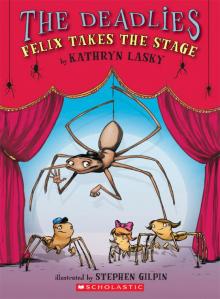 Felix Takes the Stage
Felix Takes the Stage Lucy
Lucy Lone Wolf
Lone Wolf Broken Song
Broken Song The Shattering
The Shattering The Crossing
The Crossing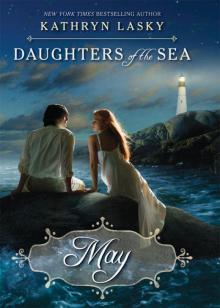 May
May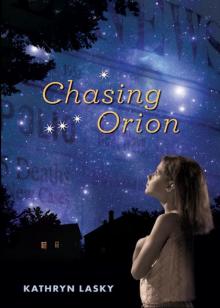 Chasing Orion
Chasing Orion Star Rise
Star Rise The River of Wind
The River of Wind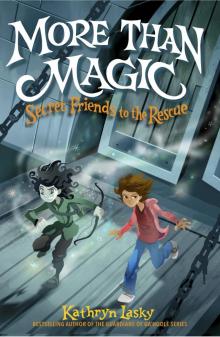 More Than Magic
More Than Magic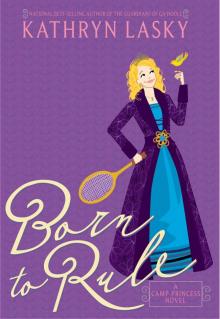 Born to Rule
Born to Rule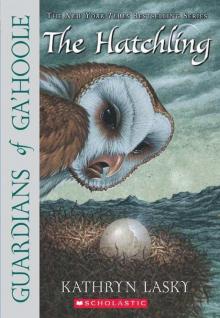 The Hatchling
The Hatchling The Rescue
The Rescue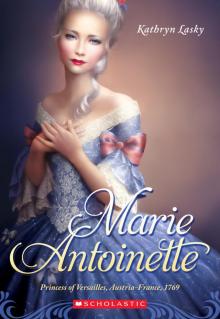 Marie Antoinette: Princess of Versailles, Austria - France, 1769
Marie Antoinette: Princess of Versailles, Austria - France, 1769 The War of the Ember
The War of the Ember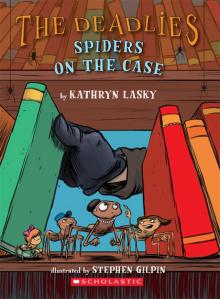 Spiders on the Case
Spiders on the Case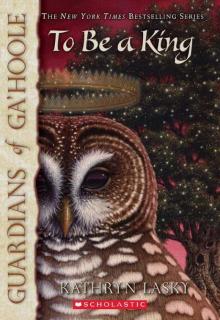 To Be a King
To Be a King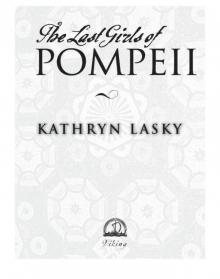 The Last Girls of Pompeii
The Last Girls of Pompeii The Outcast
The Outcast Exile
Exile Night Witches
Night Witches Spirit Wolf
Spirit Wolf The Quest of the Cubs
The Quest of the Cubs Frost Wolf
Frost Wolf The Keepers of the Keys
The Keepers of the Keys The Extra
The Extra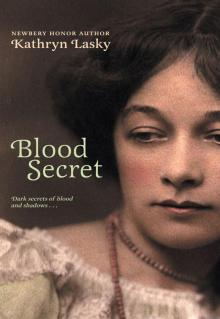 Blood Secret
Blood Secret Watch Wolf
Watch Wolf Blazing West, the Journal of Augustus Pelletier, the Lewis and Clark Expedition
Blazing West, the Journal of Augustus Pelletier, the Lewis and Clark Expedition The Capture
The Capture The Burning
The Burning The Journey
The Journey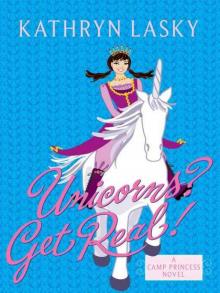 Unicorns? Get Real!
Unicorns? Get Real! The Escape
The Escape Star Wolf
Star Wolf Ashes
Ashes Wild Blood
Wild Blood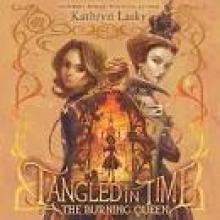 Tangled in Time 2
Tangled in Time 2 The Siege
The Siege Hannah
Hannah Elizabeth
Elizabeth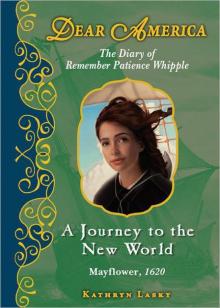 A Journey to the New World
A Journey to the New World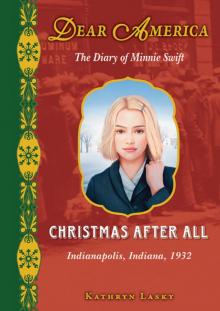 Christmas After All
Christmas After All Mary Queen of Scots
Mary Queen of Scots